Zhiyuan Zhu
Synthetic Singers: A Review of Deep-Learning-based Singing Voice Synthesis Approaches
Jan 20, 2026Abstract:Recent advances in singing voice synthesis (SVS) have attracted substantial attention from both academia and industry. With the advent of large language models and novel generative paradigms, producing controllable, high-fidelity singing voices has become an attainable goal. Yet the field still lacks a comprehensive survey that systematically analyzes deep-learning-based singing voice synthesis systems and their enabling technologies. To address the aforementioned issue, this survey first categorizes existing systems by task type and then organizes current architectures into two major paradigms: cascaded and end-to-end approaches. Moreover, we provide an in-depth analysis of core technologies, covering singing modeling and control techniques. Finally, we review relevant datasets, annotation tools, and evaluation benchmarks that support training and assessment. In appendix, we introduce training strategies and further discussion of SVS. This survey provides an up-to-date review of the literature on SVS models, which would be a useful reference for both researchers and engineers. Related materials are available at https://github.com/David-Pigeon/SyntheticSingers.
STARS: A Unified Framework for Singing Transcription, Alignment, and Refined Style Annotation
Jul 09, 2025Abstract:Recent breakthroughs in singing voice synthesis (SVS) have heightened the demand for high-quality annotated datasets, yet manual annotation remains prohibitively labor-intensive and resource-intensive. Existing automatic singing annotation (ASA) methods, however, primarily tackle isolated aspects of the annotation pipeline. To address this fundamental challenge, we present STARS, which is, to our knowledge, the first unified framework that simultaneously addresses singing transcription, alignment, and refined style annotation. Our framework delivers comprehensive multi-level annotations encompassing: (1) precise phoneme-audio alignment, (2) robust note transcription and temporal localization, (3) expressive vocal technique identification, and (4) global stylistic characterization including emotion and pace. The proposed architecture employs hierarchical acoustic feature processing across frame, word, phoneme, note, and sentence levels. The novel non-autoregressive local acoustic encoders enable structured hierarchical representation learning. Experimental validation confirms the framework's superior performance across multiple evaluation dimensions compared to existing annotation approaches. Furthermore, applications in SVS training demonstrate that models utilizing STARS-annotated data achieve significantly enhanced perceptual naturalness and precise style control. This work not only overcomes critical scalability challenges in the creation of singing datasets but also pioneers new methodologies for controllable singing voice synthesis. Audio samples are available at https://gwx314.github.io/stars-demo/.
TCSinger 2: Customizable Multilingual Zero-shot Singing Voice Synthesis
May 20, 2025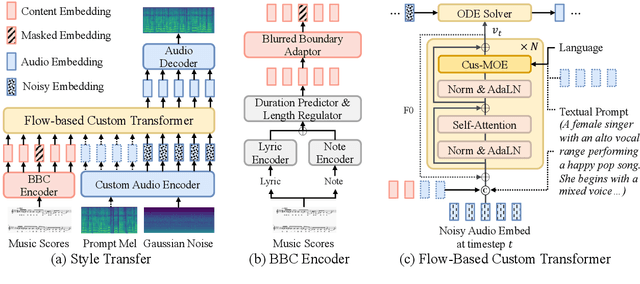
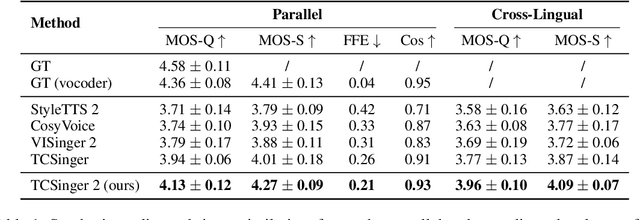

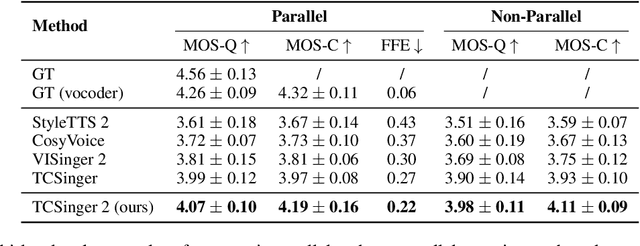
Abstract:Customizable multilingual zero-shot singing voice synthesis (SVS) has various potential applications in music composition and short video dubbing. However, existing SVS models overly depend on phoneme and note boundary annotations, limiting their robustness in zero-shot scenarios and producing poor transitions between phonemes and notes. Moreover, they also lack effective multi-level style control via diverse prompts. To overcome these challenges, we introduce TCSinger 2, a multi-task multilingual zero-shot SVS model with style transfer and style control based on various prompts. TCSinger 2 mainly includes three key modules: 1) Blurred Boundary Content (BBC) Encoder, predicts duration, extends content embedding, and applies masking to the boundaries to enable smooth transitions. 2) Custom Audio Encoder, uses contrastive learning to extract aligned representations from singing, speech, and textual prompts. 3) Flow-based Custom Transformer, leverages Cus-MOE, with F0 supervision, enhancing both the synthesis quality and style modeling of the generated singing voice. Experimental results show that TCSinger 2 outperforms baseline models in both subjective and objective metrics across multiple related tasks.
ISDrama: Immersive Spatial Drama Generation through Multimodal Prompting
Apr 29, 2025Abstract:Multimodal immersive spatial drama generation focuses on creating continuous multi-speaker binaural speech with dramatic prosody based on multimodal prompts, with potential applications in AR, VR, and others. This task requires simultaneous modeling of spatial information and dramatic prosody based on multimodal inputs, with high data collection costs. To the best of our knowledge, our work is the first attempt to address these challenges. We construct MRSDrama, the first multimodal recorded spatial drama dataset, containing binaural drama audios, scripts, videos, geometric poses, and textual prompts. Then, we propose ISDrama, the first immersive spatial drama generation model through multimodal prompting. ISDrama comprises these primary components: 1) Multimodal Pose Encoder, based on contrastive learning, considering the Doppler effect caused by moving speakers to extract unified pose information from multimodal prompts. 2) Immersive Drama Transformer, a flow-based mamba-transformer model that generates high-quality drama, incorporating Drama-MOE to select proper experts for enhanced prosody and pose control. We also design a context-consistent classifier-free guidance strategy to coherently generate complete drama. Experimental results show that ISDrama outperforms baseline models on objective and subjective metrics. The demos and dataset are available at https://aaronz345.github.io/ISDramaDemo.
Versatile Framework for Song Generation with Prompt-based Control
Apr 29, 2025Abstract:Song generation focuses on producing controllable high-quality songs based on various prompts. However, existing methods struggle to generate vocals and accompaniments with prompt-based control and proper alignment. Additionally, they fall short in supporting various tasks. To address these challenges, we introduce VersBand, a multi-task song generation framework for synthesizing high-quality, aligned songs with prompt-based control. VersBand comprises these primary models: 1) VocalBand, a decoupled model, leverages the flow-matching method for generating singing styles, pitches, and mel-spectrograms, allowing fast, high-quality vocal generation with style control. 2) AccompBand, a flow-based transformer model, incorporates the Band-MOE, selecting suitable experts for enhanced quality, alignment, and control. This model allows for generating controllable, high-quality accompaniments aligned with vocals. 3) Two generation models, LyricBand for lyrics and MelodyBand for melodies, contribute to the comprehensive multi-task song generation system, allowing for extensive control based on multiple prompts. Experimental results demonstrate that VersBand performs better over baseline models across multiple song generation tasks using objective and subjective metrics. Audio samples are available at https://aaronz345.github.io/VersBandDemo.
FetalFlex: Anatomy-Guided Diffusion Model for Flexible Control on Fetal Ultrasound Image Synthesis
Mar 19, 2025Abstract:Fetal ultrasound (US) examinations require the acquisition of multiple planes, each providing unique diagnostic information to evaluate fetal development and screening for congenital anomalies. However, obtaining a comprehensive, multi-plane annotated fetal US dataset remains challenging, particularly for rare or complex anomalies owing to their low incidence and numerous subtypes. This poses difficulties in training novice radiologists and developing robust AI models, especially for detecting abnormal fetuses. In this study, we introduce a Flexible Fetal US image generation framework (FetalFlex) to address these challenges, which leverages anatomical structures and multimodal information to enable controllable synthesis of fetal US images across diverse planes. Specifically, FetalFlex incorporates a pre-alignment module to enhance controllability and introduces a repaint strategy to ensure consistent texture and appearance. Moreover, a two-stage adaptive sampling strategy is developed to progressively refine image quality from coarse to fine levels. We believe that FetalFlex is the first method capable of generating both in-distribution normal and out-of-distribution abnormal fetal US images, without requiring any abnormal data. Experiments on multi-center datasets demonstrate that FetalFlex achieved state-of-the-art performance across multiple image quality metrics. A reader study further confirms the close alignment of the generated results with expert visual assessments. Furthermore, synthetic images by FetalFlex significantly improve the performance of six typical deep models in downstream classification and anomaly detection tasks. Lastly, FetalFlex's anatomy-level controllable generation offers a unique advantage for anomaly simulation and creating paired or counterfactual data at the pixel level. The demo is available at: https://dyf1023.github.io/FetalFlex/.
Drawing the Line: Enhancing Trustworthiness of MLLMs Through the Power of Refusal
Dec 15, 2024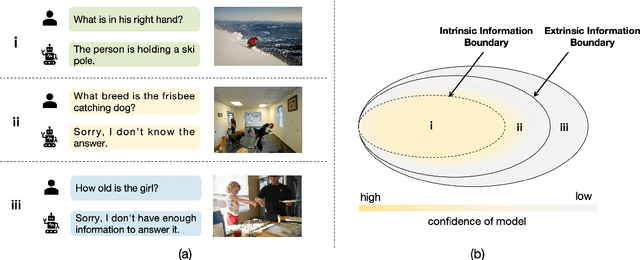

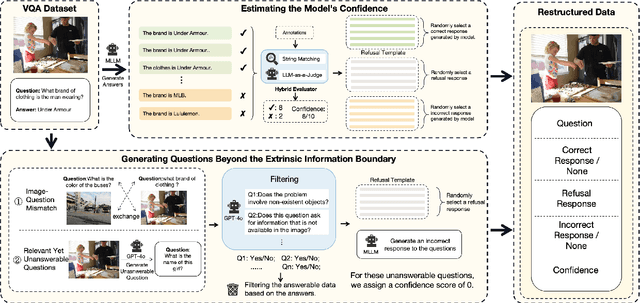
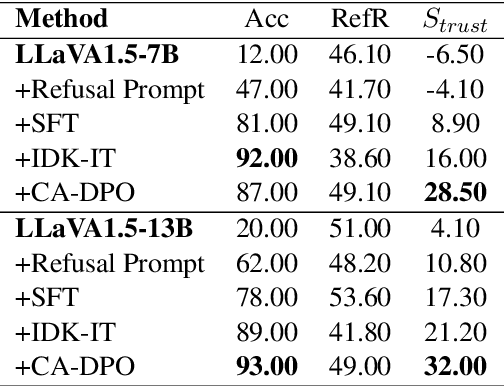
Abstract:Multimodal large language models (MLLMs) excel at multimodal perception and understanding, yet their tendency to generate hallucinated or inaccurate responses undermines their trustworthiness. Existing methods have largely overlooked the importance of refusal responses as a means of enhancing MLLMs reliability. To bridge this gap, we present the Information Boundary-aware Learning Framework (InBoL), a novel approach that empowers MLLMs to refuse to answer user queries when encountering insufficient information. To the best of our knowledge, InBoL is the first framework that systematically defines the conditions under which refusal is appropriate for MLLMs using the concept of information boundaries proposed in our paper. This framework introduces a comprehensive data generation pipeline and tailored training strategies to improve the model's ability to deliver appropriate refusal responses. To evaluate the trustworthiness of MLLMs, we further propose a user-centric alignment goal along with corresponding metrics. Experimental results demonstrate a significant improvement in refusal accuracy without noticeably compromising the model's helpfulness, establishing InBoL as a pivotal advancement in building more trustworthy MLLMs.
GTSinger: A Global Multi-Technique Singing Corpus with Realistic Music Scores for All Singing Tasks
Sep 26, 2024



Abstract:The scarcity of high-quality and multi-task singing datasets significantly hinders the development of diverse controllable and personalized singing tasks, as existing singing datasets suffer from low quality, limited diversity of languages and singers, absence of multi-technique information and realistic music scores, and poor task suitability. To tackle these problems, we present GTSinger, a large global, multi-technique, free-to-use, high-quality singing corpus with realistic music scores, designed for all singing tasks, along with its benchmarks. Particularly, (1) we collect 80.59 hours of high-quality singing voices, forming the largest recorded singing dataset; (2) 20 professional singers across nine widely spoken languages offer diverse timbres and styles; (3) we provide controlled comparison and phoneme-level annotations of six commonly used singing techniques, helping technique modeling and control; (4) GTSinger offers realistic music scores, assisting real-world musical composition; (5) singing voices are accompanied by manual phoneme-to-audio alignments, global style labels, and 16.16 hours of paired speech for various singing tasks. Moreover, to facilitate the use of GTSinger, we conduct four benchmark experiments: technique-controllable singing voice synthesis, technique recognition, style transfer, and speech-to-singing conversion. The corpus and demos can be found at http://gtsinger.github.io. We provide the dataset and the code for processing data and conducting benchmarks at https://huggingface.co/datasets/GTSinger/GTSinger and https://github.com/GTSinger/GTSinger.
 Add to Chrome
Add to Chrome Add to Firefox
Add to Firefox Add to Edge
Add to Edge